|
Home
About This Site
Air Cleaners
Audio
Carburetors
Charging System
Chassis
Cooling System
Decoding
Detailing Center
Diecast Cars
Differential
Documentation
Driveshaft
Engine Bay Detail
Engine Brackets
Engine - External
Engine - Internal
Engine Tags
Exhaust
Exterior
Favorite Links
Fuel System
Gallery 1
Gallery 2
Gallery 3
Gallery 4
Gallery 5
Gallery 6
Gallery 7
Gallery 8
Gallery 9
Gallery 10
Gallery 11
Gallery 12
Gallery 14
Gallery 15
Gallery 16
Gallery - Photos from For Sale Ads
Heater & A/C
Ignition
Interior
Junkyard Cars
Memorabilia
Mustang Monthly Article Index
Oil Cooler
Paint Info
Parts Sources
Performance Data
Photography
Pulleys/Belts
Registry 71 429 Cougar
Registry 71 429 Mustang
Smog/Emissions
Special Topic
Special Topics 2
Starting System
Statistics
Steering
Suspension
Tech Writeup Index
Transmission
T-Shirts
Trunk
Underhood Component Coatings
Videos
Vintage Ads
Under Hood Non Engine Components
Wheels/Tires
Index
| |
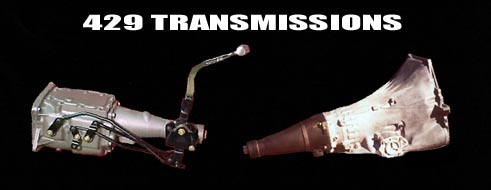
General Information
Only two transmissions were available with the 429 CJ/SCJ.
A C6 Automatic and a close ratio 4 speed Top Loader. These are described below;
(Note: Click thumbnails to enlarge pictures)
| C6 Automatic
For concours detailing of the 71 429 Mustang/Cougar C6, click this link:
C6 Concours Detail Page |



The 429 CJ/SCJ C6 Transmission
This is the special C6 transmission used on the 71 429
Mustang/Cougar. It had a special planetary, extra clutch packs and a more
powerful servo (see "R" Servo at right) than normal passenger car C6
transmissions.
|

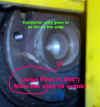

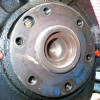 Important!
429 CJ/SCJ
Crankshaft Pilot Diameter Difference effects Torque Converter Selection
The 71 429 CJ/SCJ
used two different diameter crankshaft torque converter pilot diameters
throughout the 71 model year. The
small diameter version was 1.375" and the large diameter was
1.848". This information is important to know when selecting the
correct torque converter. If you aren't aware of this pilot diameter
difference, and install a new torque converter with a mismatched pilot,
you'll be in trouble either way. A small diameter converter pilot into the
large diameter crankshaft pilot will bolt together just fine, but will
result in a horrible powertrain vibration that you will never find
(unless you're really lucky). The large diameter pilot converter, when
mismatched with a small pilot crank, cannot insert far enough and will
prevent the torque converter bolts from coming through the holes in the
flexplate far enough to get the nuts on. However, you will probably only
discover this when you're lying on your back under your car wondering why
things won't bolt up. The photos above will show you where to measure to
avoid this nightmare that two of us have experienced ;-) |


C6 Flexplate
The 429 CJ/SCJ C6 flexplate (D1VP-6375-AA) is
shown above left. The Flexplate Reinforcement Ring is at right.
|

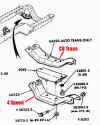
Transmission Mounting
The C6 cross member (D1ZZ-6A023-A) is shown above along
with a
diagram showing assembly. Below are photos of the correct 429 CJ C6 mount
- part number D1ZZ-6068-B (service number) and D1ZA-6068-BA (engineering
part number).




|
 

Shifter
The shifter Bezel for the C6 is shown at left and center. An
installed view of the bezel and shifter are at right. A view of the shifter
mounting location from underneath the car is shown below left. The shifter
lever pointer,
is shown below right. This piece slips onto the shifter lever and
provides the pointer for the P-R-N-D-2-1 dial. It also provides the housing
for the illumination bulb;


|
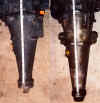
429 C6 Tail Shaft Length
The 71 429 CJ/SCJ Mustang/Cougar also came with a "short"
(14") tailshaft (as indicated by the Ford Master Parts Catalog).
Other Ford applications (ex; some Lincoln) came with the longer 17.5"
tailshaft. Also, note the mount is in a different location on the long
version.
|



429 Bellhousing/Related Components
Comparison of the 429 (left) to the 351C (right) C6 transmission
bell housing. As can be seen from this photo - if you want to drop a 429
into your 351 C equipped car, you will have to change the trans as well.
The C6 Inspection Plate is shown at center and the block plate (which fits
between trans and engine) is at right. The C6 used a C8VE-7007-A block plate
which was replaced by D1AZ-7007-A. To Paint or Not to Paint?

Did Ford paint the block plate Ford blue? We have some clues in the photo
above from this original 1971 Boss 351 block/4 speed plate. Blue paint is
visible (under the grease) on this plate on the portion facing forward in
car (starter side). No blue paint was evident on the transmission side. This
suggests the plate was installed on the engine with the 4 speed bellhousing
bolted on when the engine was painted. In addition, the bellhousing from
this same car had Ford Blue overspray all around the portion of the
bellhousing which bolts to the engine, with all of the bellhousing rearward
natural, unpainted metal. We have yet to find an untouched 71 429
Mustang/Cougar version, but this at least shows what process Ford used on
the 71 Boss 351.
|
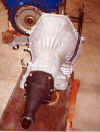


Cast Iron Tailshaft
The 71 429 CJ/SCJ Mustang/Cougar C6 came with a cast iron
tail housing as shown above.
|
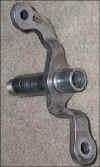




Correct C6 trans Shifter and Kick down rod Links
The photos above show the correct shifter and trans
kick down links for the 71 429 CJ/SCJ Mustang C6. |


 C6 Dipstick
The correct dipstick for the 71 429 CJ/SCJ C6 is part #
D1OP-7A020-AB. Note the yellow paint code dot on the dipstick tube
(reproduced at left, original at center and right).
|
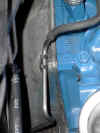
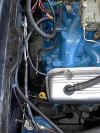
Vacuum Modulator Line |
| C6 Kickdown Rod Return Springs |
|


C5AZ for CJ with Quadrajet
The CJ w/C6 trans used a unique kickdown rod return
spring which was connected as shown to the rod itself. The other end of
the spring hooked into an eyelet on the throttle bracket (see below).

|


D1AZ for 429 SCJ with
Holley
The SCJ's return
spring was located in the normal location, along the side of the Holley's
throttle lever as shown above.
|
| C6 Kickdown Rods |
|



Kickdown Rods for C6
There were two C6 kickdown rods - one for the CJ with
the Rochestor carburetor, D1ZZ-7A187-H (above left) and one for the SCJ with the Holley
carburetor, D1ZZ-7A187-K (above right). The two rods are similar in that they each have a bend to avoid
the carb secondary linkage. However, they are in fact, different designs.
The CJ rod has a small hole in it to hook up a
return spring which attached to the rear of the throttle bracket as shown
in the photo above center. The SCJ rod did not have this hole. Also, based
on a side by side comparision of an original CJ and SCJ rod, several other
minor differences are noted: 1) There is a slight difference in the
offset between end points, 2) there is a small difference in length in the
area that dives down from the intake to the trans and 3) the bends at the
trans end occur at slightly different points. Note the SCJ kickdown rod is coded with a green
paint marking and CJ with a pink paint marking.
Comparison photos of the 429 CJ/SCJ Mustang kickdown rods are shown below.
The photo below left shows a repro CJ (made identically from an original
71 429 CJ Mustang sample) compared to an original 71 429 SCJ Mustang
sample. At center, the same two rods from another angle. Photo at right
shows a comparision of a CJ and SCJ rod on original cars;


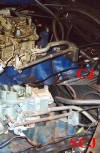
Megasite friend John Van Heertum has worked with members of our
group to borrow their original CJ and SCJ rods to be able to make us
correct reproductions. We really appreciate John doing this! Anyone
interested in obtaining one of these rods, please contact John at this
e-mail address;
jovahe@verizon.net
|
| 4 Speed Top Loader
Detailing notes: Although not necessarily
shown in all the photos on this page, the correct detailing for the 4
speed is as follows;
- The shifter rods were phosphate & oil.
- The levers that bolt to the case were painted black.
- The bell housing should be Ford blue.
- The transmission case a natural cast color.
|
|



The Toploader
In the photo at left is the correct Hurst Shifter for
the 71 429 CJ/SCJ Mustang. At center are two detail shots of the toploader. Below is an exploded view showing
the components of the clutch mechanism and how it assembles. 4 Speed Blockplate lower right - part #C9AZ-7007-B, and
an undercarriage view of
the sheet metal the shifter mounts to.

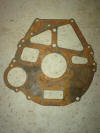

|
|

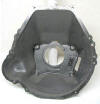

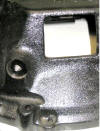
Bellhousing
|
|



429 Z-Bar and Clutch Mechanism




These two photos above are of the '71 429 SCJ Mustang
Z-bar bracket. Note the third photo from the left shows how a repro
(that was once available) looks somewhat different from the original. Note
that the 429 Mustang Z -Bar bracket (Part #D1ZZ-7A572B) is different than
the version used on the 351 Cleveland and is a very hard piece to find. At
far right is the 71 429 Mustang clutch fork. Other photos above and below
show the Z-Bar bracket installed and other views of the 429 Mustang clutch
mechanism.



 |
|



4 Speed T-Handle
The 71 429 4 speed Mustang/Cougar came with a Hurst Shifter
T Handle. Above left is an original T-Handle and an installed view is at
center. At right is a comparison between a repro and an NOS handle.
At top is shown the repro T - Handle and at bottom an NOS. Note the NOS
has a more polished look and sharper numbers than the repro.
Update 2013 - Pat Whalen (Thank you!) has
created this tutorial on how to determine if a Hurst T-Handle is an original
or a reproduction:
Tutorial on
Determining an Original Hurst T Handle
4 Speed Linkage
Below are photos from below showing the shifter linkage
hookup;


|
|


Shifter Boot
The correct shift boot for the '71 4 speed Mustang is
shown above. After years of use, many car's boots have split or torn along
the bellows parting line from movement of the shifter. Unfortunately, this
correct version with the correct rounded edge (as shown above), is not in
reproduction. If you can find an NOS one, they are very expensive. The part
number is D1ZZ -7277-B. Note that the 72 - 73 boot looks very similar to the 71, but it has a
round hole for the shifter to come through instead of the rectangular slot
used on the 71. Additional photos of the correct '71 boot are shown below;


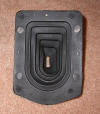
|
|



Backup Switch for 4 Speed Toploader
Part number D0ZZ-15520-A. |
|



Flywheel
This is the Flywheel used for the 429 CJ/SCJ. It is part
number C9AE-6375-C. The outer diameter measurement is shown at right.
|


4 Speed VIN Location
The VIN is usually stamped on the front rail of the
trans case, but may have been located anywhere along the front rail
and not necessarily to the left hand side as seen here. The numbers on
this case are 1F136578 indicating a 1971 Dearborn built Mustang. The body
style and engine code are not stamped. This lack of body and engine code
numbers is typical of 95 percent of all transmissions. The case shown is
most likely from a 429 SCJ since it still had the Speedo gear reducer in
place when purchased.
|


Trans ID Tag
This is the 4 speed trans ID tag located on the trans
case. The 71 429 Mustang had either a RUG-AZ or RUG-AZ-1 ID code on this
tag. |


Lower Dust Boot
Shown above is an original lower dust boot for the 71
429 Mustang/Boss 351 factory Hurst shifter.
The one shown below is a '70 repro, but is somewhat similar to the '71 and
expanded so you can better see what the shape looks like. The 71 Mustang used one with a D1ZA part number.

 |

Hurst Adapter Plate
The Hurst adapter plate was used with the 1971 CJ and
SCJ 4 Speed transmissions. This plate bolts to the tail housing and the
Hurst shifter is then bolted to it. These are unique to the 71 Big Block
Mustangs and are extremely rare.
|
|

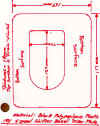
4 Speed Shifter Bezel Filler Plate
The
picture above left shows a 4 speed shifter bezel filler plate for Mustangs
with the long console (click thumbnail for photo of long console:
 ). The shifter boot bolted straight to
the floor metal, and the carpet laid on top of the boot.
The bezel then went over the boot to hide the carpet. It
fit into one of the folds of the boot (whichever one matched it the best). At
right is a template of an original bezel if you want to make your own.
Use your printer to scale the printout to the penny in the lower left
corner. Cut out the template and scribe it onto a piece of black plastic
approximately 2 mm thick and cut it out!
). The shifter boot bolted straight to
the floor metal, and the carpet laid on top of the boot.
The bezel then went over the boot to hide the carpet. It
fit into one of the folds of the boot (whichever one matched it the best). At
right is a template of an original bezel if you want to make your own.
Use your printer to scale the printout to the penny in the lower left
corner. Cut out the template and scribe it onto a piece of black plastic
approximately 2 mm thick and cut it out!
Note
that for the short console, a shifter bezel filler
plate will have a "notch" at the rear to make clearance for
the short console ash tray (as shown in photo below (see short console/ash tray photos below);
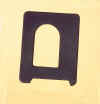


|

4 Speed Cross Member
The 4 speed cross member (D1ZZ-6A023-B) is a different design from the
version used on the C6. The diagram above shows the difference between the
two and the installation with mount.
|
  
   
71 429 Mustang Clutch/Brake Pedal Assembly |

Clutch Fork Boot
This boot covers the clutch fork and prevents
contamination from road spray.
|
|
GENERAL TRANSMISSION INFORMATION |
|



Speedometer Gear Reducer
This small gear box is the (Drag
Pak) Speedo Gear Reducer that was used on all SCJ's. It was fitted on the
trans, on the end of the speedo cable. The one shown at left is the C6
trans version (C8ZZ-17294-A). The 4-Speed version (C9ZZ-17294-A), shown at right, was made at a 90 degree angle (L
shaped) for a better fit, as opposed to the straight body for the C6.
These gear boxes allowed the speedometer to read correctly with the low
rear end gears of the SCJ, (3.91 or 4.11). The gear box required a
special "Drag Pak" speedo cable that had a screw-on end which
screwed onto the threaded portion of the gear box. The regular non-Drag
Pak cable had the standard press into the side of the trans fit. The C6
reducer is shown below in an installed view in an original 71 429 SCJ
Mustang C6.

|
|


Speedometer Cable
This is the special speedometer cable used with 429 SCJ
Drag Pack Speedo adaptor. Note the special threaded fitting (at red arrow) that attaches
to the Speedo adaptor. The D1ZF-17260-DA, EA or EB were used with the C6
and D1ZF-17260-EA, FA or FB were used on the 4 speed. A view of a
non-drag pack speedo installed in a C6 housing is shown below.

|

Dan
Schott's 73 Convertible with a 429 CJ engine
|
![]()
![]()